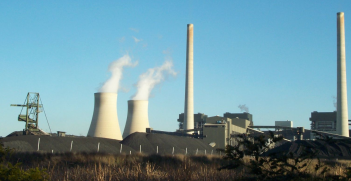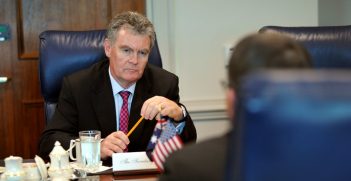Renewable Energy for Australia’s Security: Integrating Domestic and Foreign Policy

The relationship between energy policy and national security has been overlooked in discussions of Australian renewable energy policy. The Australian government should invest in renewables to strengthen our security.
In the last few years, debate has raged over Australia’s energy, environment and climate change policies. An overlooked facet of this debate is the relationship between Australian energy policy and our national security. Failure to curb emissions or move away from fossil fuel dependency hurts our strategic interests. By developing supportive policy and investing in a renewable grid, Australia can reinforce our regional relations, promote autonomy, harden against external influences and ultimately improve our security.
The groundwork for an Australian energy transition is already underway. The ANU Energy Change Institute won the university’s Grand Challenge Scheme 2018 with a proposal to research the potential for Australian exports of zero-carbon energy to the Asia-Pacific. This would not only curb global greenhouse gas emissions, but also diversify Australia’s energy economy and deliver low-pollution energy solutions for countries plagued by smog.
While the primary technologies of renewable energy generation and storage are well understood, the challenge of how to export this energy remains. The Energy Change Institute points to emerging technologies for hydrogen generation, storage and transfer as examples of zero-carbon methods to store and export renewable energy. Federal support for research and implementation of such technologies would accelerate renewable energy adoption and provide significant returns in terms of both economy and security. Hydro-electric power stations also offer domestic storage capacity, such as the Snowy Hydro Scheme, which both generates hydroelectricity and regulates energy market fluctuations through storage.
Asia’s economic growth and large population requires energy, and renewables will form a growing percentage of this demand. In Southeast Asia, renewable energy technologies offer an effective approach to socioeconomic and equity challenges. Leading energy consumer China is targeting an “energy revolution” to focus on renewable energy sources into the future. Australia risks losing its regional influence as an energy exporter if we fail to diversify from coal and high-carbon exports. By developing a renewable, low-carbon export sector, Australia can ensure it is valued by our neighbours, deepening economic integration and improving our security. It will ensure we retain and increase leverage in our trade relations with China, as the emergent superpower seeks to ensure energy security whilst improving standards of living.
As a wealthy and capable middle power, Australia has a mix of interests and responsibility in regional and international leadership. Preventing conflict abroad, particularly in our neighbouring regions, is vital to Australian security interests and important to humanitarian values. Energy and the potential for conflict are closely linked in the Indo-Pacific. Oil and coal imports essential to the functioning of states such as China, Japan, and India flow through complex and contested sea lanes such as the South China Sea. As states compete for the limited pool of importable energy, tensions rise. By contributing to energy availability through renewable technology development and export supply, Australia may extricate itself from this source of conflict, whilst alleviating tensions and escalation risk in our region.
The adoption of an energy policy that is climate-change aware and sustainable would also strengthen Australian security through the preservation of relations with our Pacific neighbours. Since colonial administration, Australian governments have feared foreign powers gaining a foothold in the Pacific and thus having the ability to launch attacks on Australian soil. That this fear remains strong has been shown in recent public debate about China’s influence in the region. Australia’s domestic policies work against our interests in maintaining strong, dependable relations with Pacific Islands.
The Boe Declaration, signed between members of the Pacific Islands Forum including Australia in 2018, reaffirms that the single greatest threat faced by the Pacific region is climate change. Yet Australia is slow to adopt efforts to avoid climate change, offering Pacific Islands hundreds of millions of dollars to mitigate the effects of climate change whilst consuming and exporting fossil fuels on a vast scale. An energy policy supporting renewables development in Australia for domestic use (and potential export as suggested above) would reinvigorate Australian-Pacific relations and build trust in the region, supporting our efforts to secure that strategic space.
A renewable energy boom also offers Australia the once-in-a-lifetime opportunity to harden its infrastructure against cyber-attacks and foreign influence. By engaging with renewable energy development through policy and investment, the Australian government can ensure new infrastructure is built from the ground up with security provisions in place. We can ensure management of foreign influence involved in this infrastructure, for example, by supporting Australian development and ownership of new systems through subsidies and proactive policy-making. Finally, new technologies such as battery storage will support the grid’s resilience to shocks, guaranteeing supply, and hardening it against interference such as cyber attacks.
Developing a federal energy policy that supports renewable energy for domestic consumption and export would deliver significant benefits for Australia’s security. Tackling climate change is not only a matter of costs: productive energy change will grow and strengthen Australia’s economy, foreign relations, and security. Unifying domestic and foreign policy on the energy front would be a bold step forward to a strong, vibrant Australia in the 21st century.
Xavier Wilks is an intern with the AIIA National Office, and is in his third year of Bachelor of International Security Studies at ANU.
This article is published under a Creative Commons Licence and may be republished with attribution.





